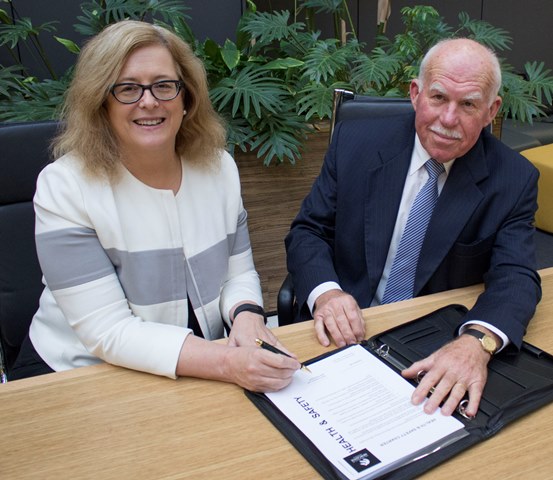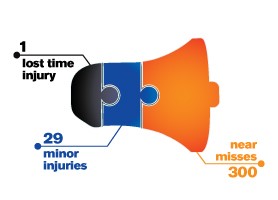Safety first at UON
The University of Newcastle has made a firm commitment to the safety of its staff and students with the Chancellor, Mr Paul Jeans and the Vice-Chancellor, Professor Caroline McMillen, recently co-signing the first UON Health and Safety Charter.

"Creating a culture of safety requires shared values and most importantly, sustained collective effort," the Chancellor, Mr Paul Jeans said.
"Every single person who sets foot on one of our campuses has a right to safety, and with that comes responsibility.
"The UON Health and Safety Charter should eliminate any ambiguity around expectations for our staff, students and visitors," he said.
The Charter is a commitment to continuous improvement in health and safety.
A NeW Futures priority
Vice Chancellor, Professor Caroline McMillen said that the draft NeW Futures Strategic Plan makes our intention very clear and sets the bar high.
"Our goal over the next ten years is to be the safest and healthiest University in Australia for staff and students," Caroline said.
"Placing health and safety in our strategic plan ensures that it is everyone's responsibility."
More than just lofty statements of intent, the UON Health and Safety Charter outlines how we intend to reach this leadership position. Its signing kick-starts a campaign to encourage staff and students to be proactive in minimising risk and injury
"Safety comes down to many things – the way we lead, the resources we commit and the systems and processes we have in place," Caroline said.
"Above all, is about each and every one of us being smart, alert and prepared to act."
You make the call
The Health and Safety Team has launched a new campaign to
encourage all staff to be alert to hazards and report near misses.
Dr Maggie Goldie, Associate Director Health and Safety, Human Resource Services, points to the statistics as all the proof needed that reporting near misses will reduce injuries.
"For every lost time injury, there are statistically 29 minor injuries and around 300 near misses," Maggie said.
"Near misses are warnings. If we get better at recognising them and reporting them for further investigation, we can bring the rate of injury down."
Find out more about the 'Make the call' campaign
Contact
- Dr Maggie Goldie
- Phone: 4913 8140
Related news
- University proposes new student accommodation at Callaghan Campus
- University proposes new student accommodation at Callaghan Campus
- Healthy recognition: Dietitian earns prestigious Australian science honour
- Nine Newcastle teams secure $5.4m in ARC Discovery grants to unearth new knowledge
- Nine Newcastle teams secure $5.4m in ARC Discovery grants to unearth new knowledge
The University of Newcastle acknowledges the traditional custodians of the lands within our footprint areas: Awabakal, Darkinjung, Biripai, Worimi, Wonnarua, and Eora Nations. We also pay respect to the wisdom of our Elders past and present.